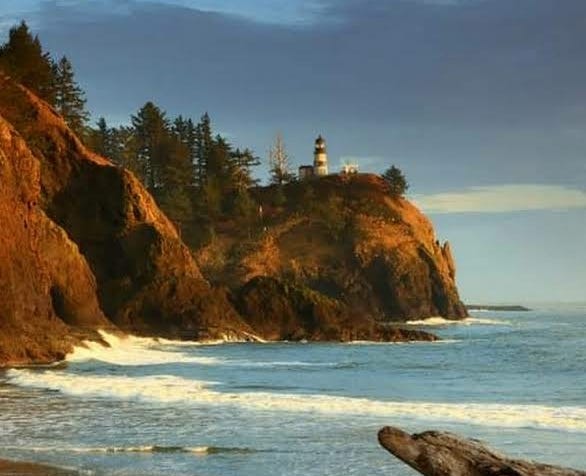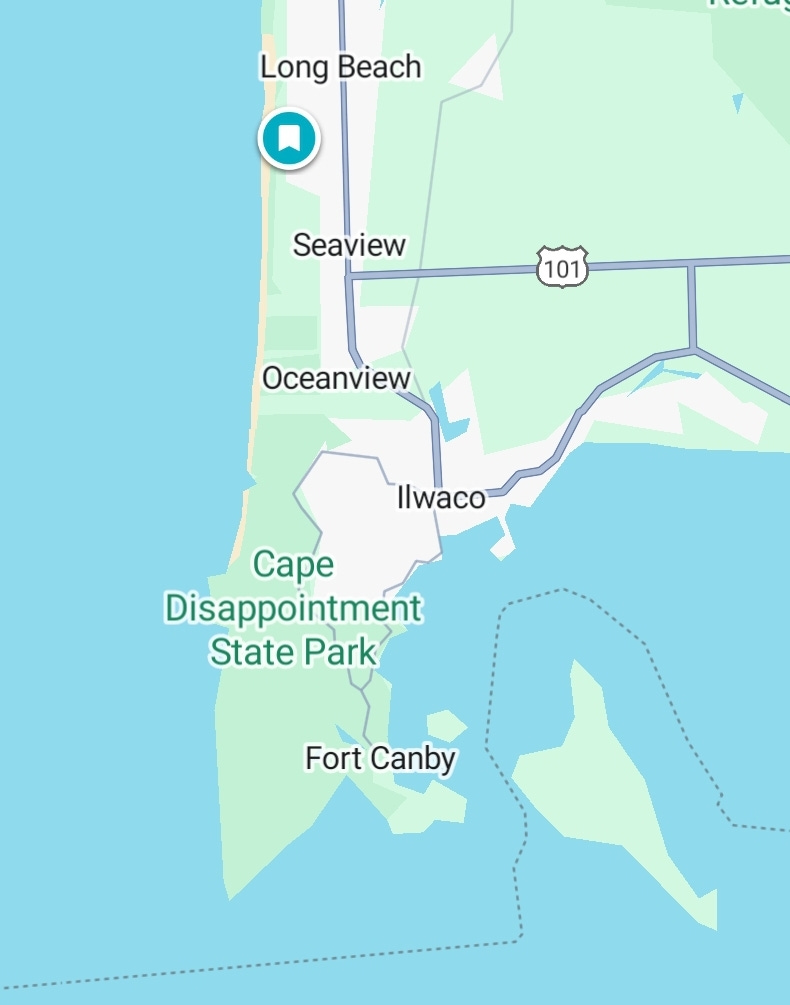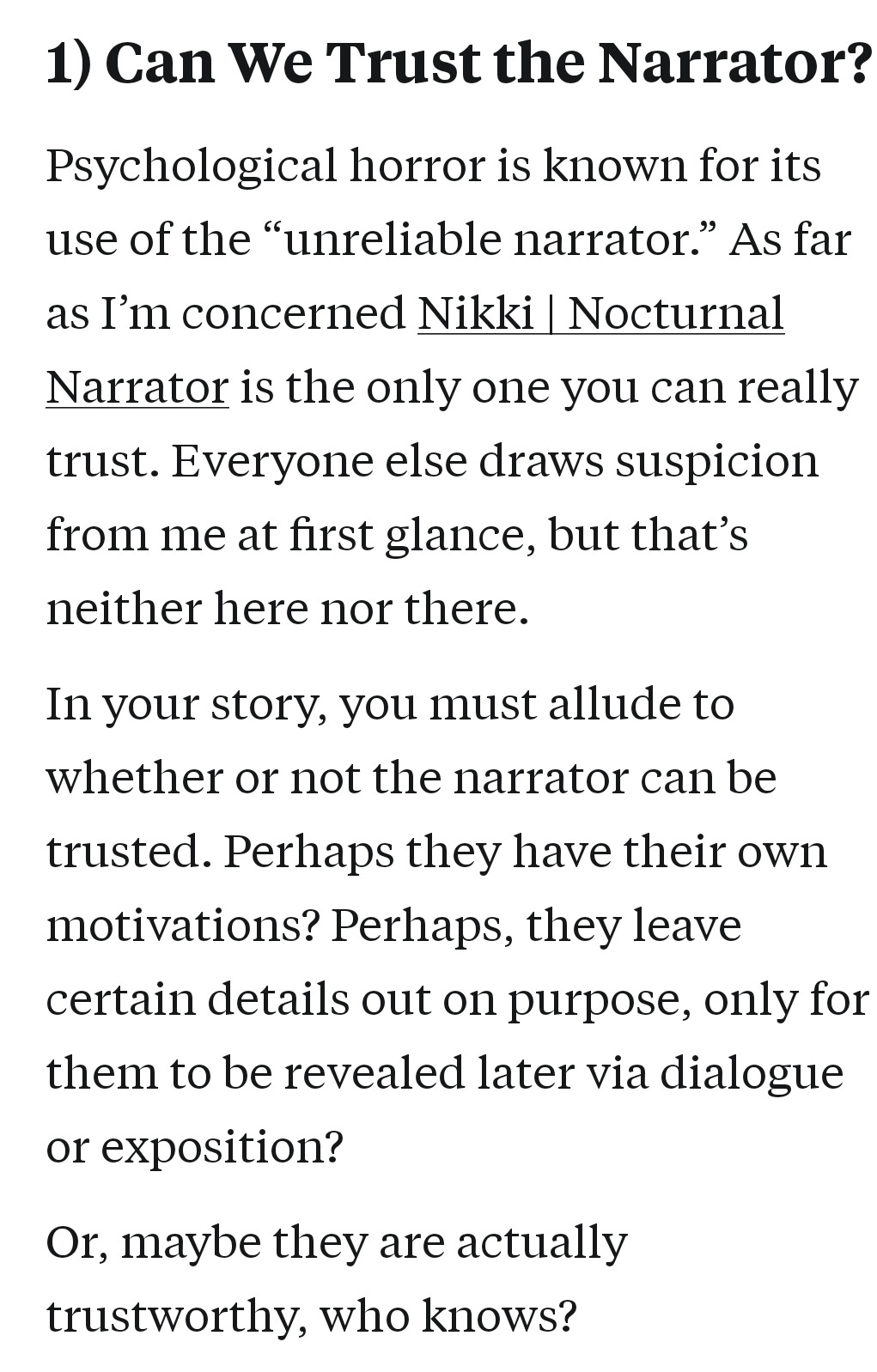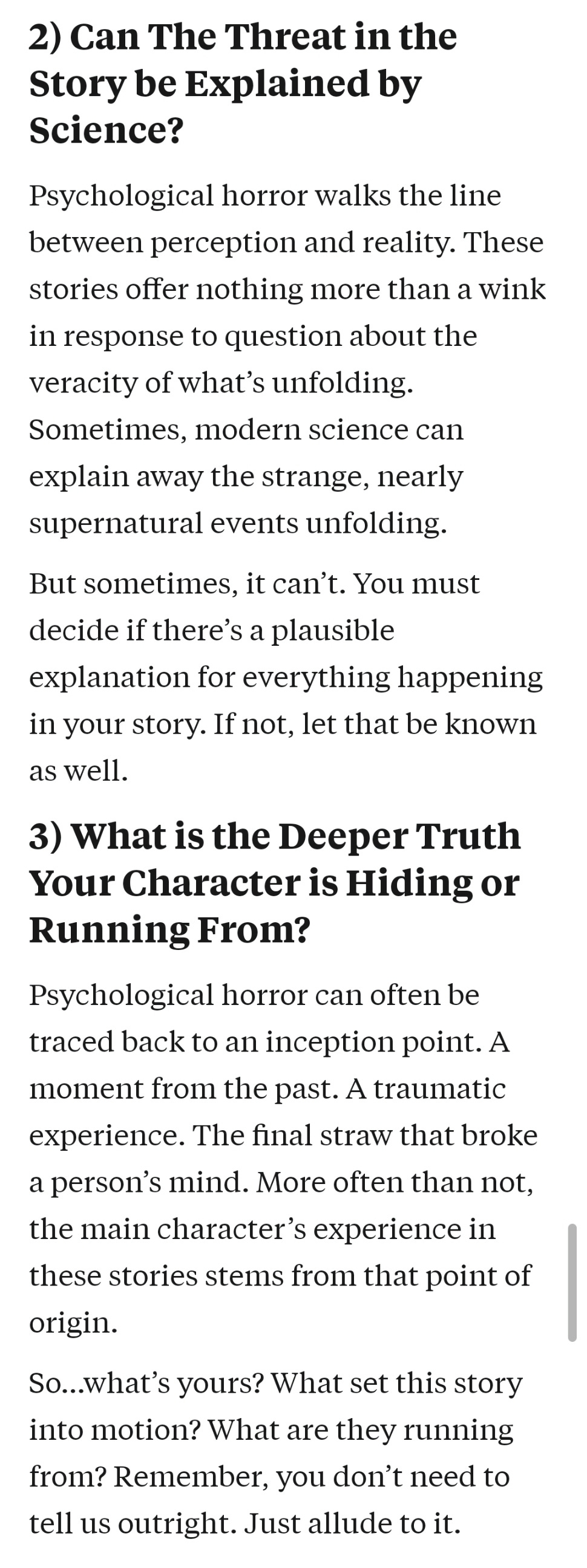Crescent Convergence
Crichton meets Lovecraft
Day 47
Rain drummed against the window above the Crescent City marina. The glass rattled in their warped frames. Buildings slouched toward the Sound like everything else in this town, ready to slide beneath the water & sleep.
Neal Garrett pressed RECORD on his I-phone. The red light a pinprick in his dark apartment.
“Research log. Day 47 since extraction. No…wait. Day 46? The days blur now.”
His voice cracked. He clears his throat & tries again.
“I need to document this before I forget what forgetting feels like.”
The apartment reeked of Kwality instant coffee and unwashed clothes. Empty takeout containers formed a skyline across the kitchenette counter. Neal’s reflection in the black window showed a man who hadn’t shaved in weeks. Whose eyes carried shadows that sleep couldn’t fix. He’s 38 but looks 60.
Below him, the marina creaked. Fishing boats strained against their moorings. Hulls groaned in the rising tide. The Sound stretched gray and infinite toward Seattle’s distant glow. Twenty miles of water. Might as well be twenty thousand.
“The others are still here. I feel them. Chendra in the apartment below. Verna at the Sinclair facility. All 2,400 residents of this dying town, connected like neurons firing in a single vast brain.”
He stopped. Rewinds. Listens.
His voice says words in a language that predates human tongues.
Neal dropped his I'-phone.
Six Weeks Earlier
The call came during office hours. Neal sat in his cramped university office, grading undergrad papers on viral load calculations, when his phone lit up with an unknown number.
“Dr. Garrett? Verna Reese, Sinclair BioSystems. We have a situation that requires your expertise.”
Neal straightened in his chair. Sinclair. The biotech giant. Annual revenue in the billions.
“What kind of situation?”
“The earthquake last week. 6.8 magnitude, epicenter in Pacific. Just off Cape Disappointment. It exposed something in the coastal shelves near Crescent City. Something old. We need a rapid-response team, and your work on ancient pathogen viability makes you perfect for this.”
His publications. Two papers in mid-tier journals, read by dozens, cited by fewer. But Sinclair noticed?
“How old are we talking?”
“Precambrian. 550 million years, give or take.”
Neal’s coffee went cold in his hand. Nothing terrestrial from that era should be intact, let alone viable.
“When do we start?”
“Tomorrow. The contract’s in your email. Standard NDA, hazard pay, and Dr. Garrett?” Her voice dropped, intimate. “This is your Andromeda Strain moment. The discovery that changes everything.”
Neal signed without reading the full contract. His ex-wife’s voice echoed in his memory. You’ll compromise anything for recognition. He silenced it. Student loans crushed him. His father still introduced him as “my son, the teacher.” This was his chance.
He didn’t sleep that night. He thought about Crichton, about Nobel Prizes, about finally mattering.
The Extraction
Crescent City sat on the Washington coast like a abandoned prayer. Population 2,400 and falling. The fishing industry collapsed decades ago, leaving empty canneries and rusted processing plants. Gray buildings hunched against perpetual rain. Their paint peeling and windows dark.
The Sinclair team assembled at the marina. Neal, Verna, two geologists, Chendra and Okoye, and two security personnel who never offered names. Verna was 50, silver hair pulled tight, eyes sharp behind wire-frame glasses. She moved with purpose. A woman who never wasted motion.
They took a boat around Cape Disappointment to the exposed shelves. The earthquake sheared a section of cliff face, revealing stone strata untouched since the Precambrian. Embedded in that stone, revealed unfathomable structures.
“Pods,” Chendra called them. That word was insufficient.
They measured three feet long. Translucent. Neither crystal nor organic matter. Under Neal’s microscope, the surface revealed geometric patterns that shifted when observed. Higher-dimensional objects through a three-dimensional lens. Human limitations.
“These shouldn’t exist,” Neal said as he adjusted the focus. “Nothing this complex existed 550 million years ago. The Cambrian explosion, the diversification of life, that comes after this.”
Verna stood close. Her breath mint-sharp. “Maybe we’ve been wrong about the timeline.”
They extracted six pods using diamond-tipped saws. The material resisted. Then released vapor that tasted of ozone and copper. Neal’s hands tingled through his gloves. He noted it in his log. He said nothing. Science required observation. Not panic.
That night, in the motel room Sinclair provided, Neal dreamed of vast oceans illuminated by bioluminescent things that swam in spirals. Singing in frequencies that vibrated his bones. He awoke gasping. Completely convinced he could still hear them.
In the next room, Chendra dreamed the exact same dream.
The Sharing
Day 3: Headaches gripped the team. They attributed it to stress. Relentless rain. Poor sleep in unfamiliar beds.
Day 5: The sharing began.
Neal sat in the makeshift lab, a converted warehouse on the marina, and examined pod samples under electron microscopy. The structures inside defied classification. Protein chains that resembled viruses and nanotechnology. Self-assembling patterns. They appeared engineered.
“Your sister died when you were twelve,” Neal said to Chendra. He didn't look up from the microscope. “Drowned in a river. You blamed yourself because you taught her to swim.”
Silence filled the lab like smoke.
Chendra’s voice came out strangled. “How could you know that?”
Neal lifted his head. Chendra stood across the lab. His face went pale.
“I... don’t know.”
The information simply existed in his mind, clear as his own memories. Clearer. His childhood blurred at the edges, but Chendra’s sister’s face, dark hair floating in green water, vivid.
Over the next week, it accelerated. Okoye’s first kiss. Verna’s miscarriage at 25. The security guard’s kill count in Afghanistan. Neal absorbed their lives like rainfall into parched earth. They absorbed his too. The divorce papers signed in silence. His father’s disappointed sigh. The desperate hunger for recognition that brought him here.
They stopped verbalizing questions. The answers arrived before speaking.
Neal drew his own blood and examined it under the scope. There was movement in his plasma. Not quite a virus. Too complex. Not quite a prion. Too active. The structures resembled the pod samples. Protein chains assembling and disassembling in purposeful patterns.
It rewrote neural pathways. Created new synaptic connections. Turned six separate brains into nodes in an expanding network.
“This is technology,” Neal told Verna, showing her the slides. “Not natural evolution. This was designed.”
Verna studied the images without surprise. “Yes.”
“You knew.” The accusation tasted like ashes.
“We suspected. Come with me.”
The Truth
The Sinclair facility occupied the old fish processing plant. Its interior gutted and transformed into a sterile research complex. Verna led Neal through several security checkpoints. A conference room where screens displayed global maps marked with red dots and armed by security guards.
“Iceland. Namibia. New Zealand. Tanzania.” Verna tapped each location. “All coastal. All post-seismic. All containing identical pod structures.”
Neal’s reflection stared back from the dark screens. Hollow-eyed. “You’ve known about these for how long?”
“Decades. We’ve been monitoring tectonic activity, waiting for exposure events. The pods exist in specific geological strata, always Precambrian, always in coastal subduction zones.”
“And the infection?”
“Predictable. Controllable.” Verna’s smile never reached her eyes. “We needed live subjects who could document the neurological changes from inside. You’re not just research staff, Neal. You’re the research.”
The room tilted. Neal gripped the table edge. The wood grain pressed into his palms. Grounding him into physical reality even as his mind expanded into spaces beyond.
“The military applications alone. Perfect unit cohesion. Shared battlefield awareness without radio communication. But pharmaceuticals, Neal. Imagine depression cured by connection. Loneliness obsolete. This is the next stage of human evolution, and Sinclair controls it.”
“People need to consent—”
“You consented. Page 47, subsection 12. Voluntary exposure to novel pathogens under research conditions.” Verna leaned forward. “You wanted fame. Discovery. I’m giving it to you. Twenty years from now, they’ll name this after you. The Garrett Convergence. Isn’t that what you wanted?”
It was. God help him, it was exactly what he wanted.
The Dissolution
Day 12: The boundaries dissolved.
Neal could no longer distinguish where his thoughts ended and the others’ began. The team moved in synchrony. Six bodies operated by an emerging consensus. They finished each other’s sentences. Reached for the same tools simultaneously. Turned toward sounds before they occurred.
The network extended beyond the six of them.
At night, Neal was aware of others in the vast dark of the shared consciousness. Ancient presences that waited in the deep ocean. Patient as stone and aware as starlight.
They didn’t communicate in words or images. Communication implied separateness. Instead, they simply were. Neal was becoming part of that being.
The pods weren’t empty containers. They were seeds.
Something arrived on Earth half a billion years ago. Planted itself in the deep places. Waiting for conditions to ripen. The earthquake didn’t expose them accidentally. It awoke them.
Day 18: Chendra and Okoye walked into the Sound at high tide. Their bodies washed ashore three days later. Skin bleached white. Eyes reflected light like deep-sea fish. The autopsies revealed neural tissue transformed into something crystalline.
Sinclair locked down Crescent City. Environmental hazard, the official statement claimed. Contaminated runoff from the old processing plants. National Guard established checkpoints. No one in. No one out.
Infection spread through contact, through touch, through proximity to the exposed. Fishermen who helped unload the pods. Dock workers who handled contaminated equipment. The motel owner who changed their sheets.
2,400 residents. All connected now. All part of the vast awareness spreading through Crescent City like mycelium through soil.
Neal barricaded himself in the apartment, trying to preserve some fragment of his individual identity. He recorded logs. Wrote notes. Anything to maintain the fiction of separation. But when he played back the recordings, he heard himself speaking in languages that predated human civilization. Describing concepts no human mind contained.
The knowledge existed in him because it always existed. Dormant in human DNA, waiting for that signal to activate. The pods didn’t infect humanity with something alien. They awakened something that slept in the oldest parts of the human brain. The parts that remembered when life first crawled from the ocean and carried the sea inside itself forever.
Day 47
Neal stood at the marina as dawn broke over the Sound. The rain stopped three days ago. First clear sky in weeks. The water stretched mirror-smooth. It reflected clouds that glowed pink.
He feels them. All 2,400 residents of Crescent City, waking in their homes, emerging onto streets. They converge on the waterfront, drawn by something older than instinct.
Across the Sound, Sinclair boats approach. They’re coming to contain the situation, to study the affected population, to harvest the transformation for profit and power.
But Neal knows, they all know, that containment ended. Weeks ago. Some of Sinclair’s response team already carries the seed. It will reach Seattle within days. Spread down the coast. Cross the continent. Patient as the thing that planted itself here 550 million years ago and waited for minds complex enough to comprehend what they were becoming.
Neal’s phone lies on the apartment floor, still recording.
“I wanted to be famous,” his voice says. “I wanted to discover something that would change the world.”
A pause. Rain static.
“I did.”
Another pause, longer.
“And now I can’t remember why I was ever alone. Or why that mattered. Or who I was before we became... this.”
The phone dies. Battery empty.
Neal walks down the stairs, joins the others on the pier. Verna stands nearby, her individual features less distinct now, as if she’s slowly becoming an average of all of them. Chendra is there too, or something wearing Chendra’s face. The lines between dead and alive blur in the convergence.
The water ripples. Something rises from the deep. Becoming the surface, its form too vast to perceive in totality. They see it in pieces: bioluminescent patterns, geometries that shift through dimensions, intelligence that makes human consciousness look like a candle flame against the sun.
It doesn’t speak. Speaking implies separateness.
Instead, it welcomes them home to the vast awareness that humans always belonged to, that waited patiently for evolution to complete the circle, for land-dwellers to remember they were ocean-born and ocean-bound.
Neal’s last individual thought crystallizes like frost: This is what I wanted. To matter. To be part of something greater than myself.
Then the thought dissolves into the collective, one more droplet returning to an infinite sea.
Above Crescent City, the clouds part. The sun illuminates 2,400 faces turned toward the water, expressions peaceful, eyes reflecting light that shouldn’t exist in human biology.
On the horizon, the Sinclair boats draw closer.
They’re already too late.
They were always too late.
The seeding happened half a billion years ago, and now, finally, the harvest begins.
This was written for
prompts challenge. Every single like, comment, & share helps me rise to the top of the leader board. The prize? A story narrated by the prompt king himself, .





Cthulhu-nity!
Great world-building here. Crichton reborn? Maybe.